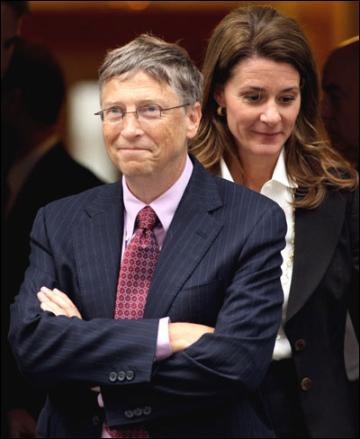 New York, Mar 4: Microsoft co-founder Bill Gates has regained the title of the world's richest man in the Forbes magazine's annual billionaire list that includes 56 India based billionaires led by RIL Chairman Mukesh Ambani.
New York, Mar 4: Microsoft co-founder Bill Gates has regained the title of the world's richest man in the Forbes magazine's annual billionaire list that includes 56 India based billionaires led by RIL Chairman Mukesh Ambani.
Gates is back at the top spot after a four-year hiatus, reclaiming the title of world's richest person from Mexican telecom mogul Carlos Slim Helu, who had ranked number 1 for the previous four years.
Gates, whose fortune rose by USD 9 billion in the past year to USD 76 billion, has held the top spot for 15 of the past 20 years.
"After years focused on his philanthropy, Gates plans to spend more of his time working with product managers at Microsoft as rivals like Google and Apple continue to outshine the company in the market," Forbes said.
With a networth of USD 18.6 billion, Reliance Industries Ltd (RIL) chief Mukesh Ambani leads the pack of 56 billionaires based in India featured on the list.
His younger brother Anil Ambani is ranked 281st on the list with a net worth of USD 5 billion.
However, Forbes said the richest Indian person has seen "precipitous decline" in his fortune since 2008 when his networth was USD 43 billion and he when was the world's fifth richest person.
"Regardless he remains India's richest person and is still bullish; says he plans to invest USD 25 billion in his businesses over the next 2 years," Forbes said.
The magazine also referred to accusations of wrongdoing made against Reliance by Aam Admi Party founder Arvind Kejriwal, who had recently alleged that Ambani is "running the government".
The other Indian billionaires in the list are ArcelorMittal Chairman and CEO Lakshmi Mittal who is ranked 52nd with a networth of USD 16.7 billion, Wipro Chairman Azim Premji ranked 61st with USD 15.3 billion, founder of Sun Pharma Dilip Shanghvi ranked 82nd with USD 12.8 billion, HCL co-founder Shiv Nadar is ranked 102nd and has a net worth of USD 11.1 billion. Hinduja brothers came in at the 122nd with USD 10 billion.
Birla group chief Kumar Birla is ranked 191st and has a networth of USD 7 billion, Forbes said the ranks of the world's billionaires continued to scale new heights and stretched to new corners of the world.
The list has 1,645 billionaires with an aggregate net worth of USD 6.4 trillion, up from USD 5.4 trillion a year ago. The list features a record 268 new ten-figure fortunes, including 42 new women billionaires.
In total, there are 172 women on the list, more than ever before and up from 138 last year.
The year's biggest dollar gainer was Facebook's Mark Zuckerberg, whose fortune jumped USD 15.2 billion, to USD 28.5 billion, as shares of his social network soared.
Facebook's COO, Sheryl Sandberg, joins the ranks for the first time, as does the company's longtime vice president Jeff Rothschild.
Also, thanks to a USD 19 billion deal with Facebook, WhatsApp founders Jan Koum and Brian Acton join the ranks of Silicon Valley's wealthiest for the first time. They are 4 of 26 newcomers whose fortunes come from technology, 10 of whom are American, including Dropbox CEO Drew Houston and Workday cofounder Aneel Bhusri.
The US once again leads the world with 492 billionaires, followed by China with 152 and Russia with 111. The list has new billionaires from Algeria, Lithuania, Tanzania and Uganda.
The other Indian billionaires on the list are Indian telecom tycoon Sunil Mittal, who is ranked 244th and has a networth of USD 5.7 billion. Forbes said Mittal saw his wealth decline by USD 1.1 billion despite big
moves to cement his Bharti Airtel's position as India's biggest mobile operator which has 200 million domestic customers.
Savitri Jindal and family, is on the 295th spot tied with vaccine billionaire Cyrus Poonawala and Essar group's Shashi and Ravi Ruia, India's richest banker Uday Kotak is ranked 396th followed by Godrej group chief Adi Godrej (446), real estate mogul Kush Pal Singh (551), Hero group founder Brijmohan Lall Munjal (731), brothers Malvinder and Shivinder Singh, who control hospital chain Fortis Healthcare (828).
Sun TV Network's Kalanithi Maran (796), Indian two wheeler tycoon Rahul Bajaj (973), Infosys executive chairman N.R. Narayana Murthy (1046) and former chief executive of Infosys Nandan Nilekani (1210) are also in the list.
In the top-ten are Oracle founder Larry Ellison at the 5th spot with USD 48 billion, Koch Industries CEO Charles Koch at 6th with USD 40 billion, and Chairman and CEO, Arvest Bank Group Jim Walton on the 10th rank with USD 34.7 billion.
For the 28th annual billionaire list Forbes, compiled networth by valuing individuals' assets–including stakes in public and private companies, real estate, yachts, art and cash–and take into account estimates of debt.
Spanish clothing retailer Amancio Ortega (best known for the Zara fashion chain) retains 3rd rank for the second year in a row, extending his lead over Warren Buffett, who is again on 4th spot.
American gambling tycoon Sheldon Adelson, who added USD 11.5 billion to his pile, makes it back into the top ten for the first time since 2007.
Roughly two-thirds of the billionaires built their own fortunes, 13 per cent inherited them and 21 per cent have been adding on to fortunes they received.
Other notable newcomers include World Wrestling Entertainment CEO Vince McMahon, fashion king Michael Kors and Denise Coates of UK online betting firm Bet365.
Forbes said not all countries–or tycoons–had good years.
Turkey lost 19 billionaires due to soaring inflation, a sagging stock market and a declining value in its currency.
Indonesia, whose currency tumbled 20 per cent against the dollar, now has eight fewer ten-figure fortunes. Altogether 100 people dropped out of the ranks, while another 16 passed away.





Comments
Add new comment